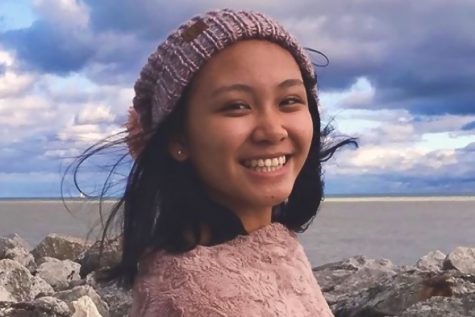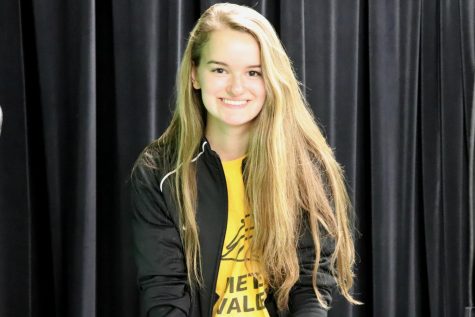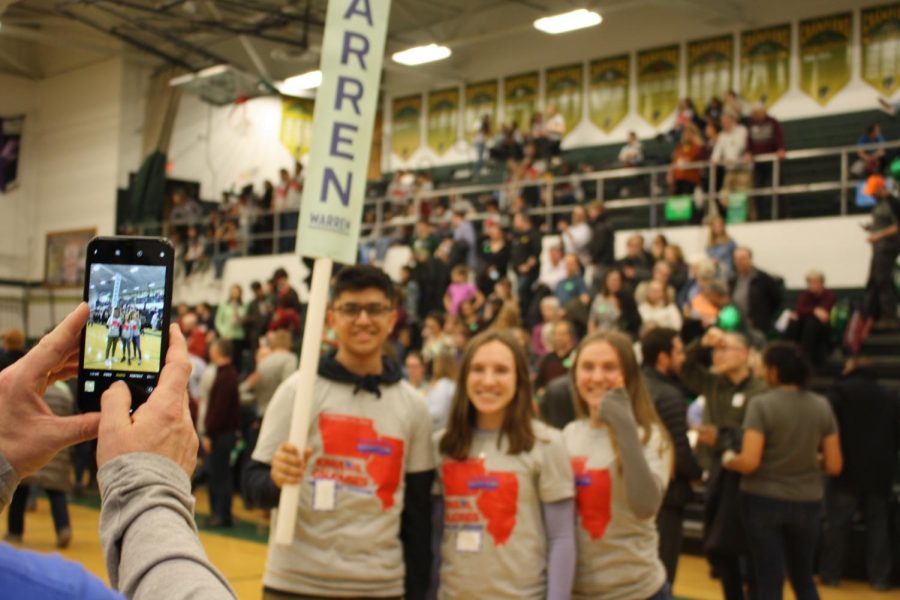IPSD students experience firsthand chaos of the 2020 Iowa Caucus
Caught in the adrenaline rush of early election mayhem, 45 high school students from District 204 who received financial support from the Mikva Challenge, IPEF, and League of Women Voters were able to observe the Iowa Caucuses from Iowa City on Monday.
The political enthusiasts first touched ground in the notorious swing state with a special visit from presidential candidate Andrew Yang and his wife, Evelyn Yang. The pair later set out to Des Moines, Iowa to encourage constituents to caucus for his campaign.
“Seeing Yang was really a thrill. When we were all in that office, we were cheering him on. He was so articulate and so sweet,” Social Studies teacher and chaperone Susan Fuhrer said.
Chaperones who organized the trip were able to secure connections with the top six Democratic candidates whom students would canvas for starting Monday afternoon. Participants went on a tour to visit the presidential candidates’ campaign offices and learn about their key initiatives for the election. From there, the clan of students rushed out to campaign offices and began canvassing.
Participants in the Iowa caucuses are proud to take part in what has historically been a nostalgic tradition for them as Midwestern voters. Iowans describe how a large number of precincts are not only held in schools or gymnasiums but even barns or living rooms. Students canvassing for Democratic candidate Elizabeth Warren gathered in their campaign representative’s own home before setting out in the surrounding neighborhood.
Senior Katie Hausman was in Warren’s campaign group and mentioned she had been intrigued by the more intimate process of canvassing for a presidential candidate.
“Knocking on peoples’ doors and having discussions with them about politics and their preferences were really eye-opening,” Hausman said.
After the daytime canvassing, the group went to Iowa City West High School to observe one of three precincts held at the school that night. Campaign managers handed out stickers and signs to countless of the 525 total voters who were also decked out in candidate T-shirts and paraphernalia.
In order for a candidate to be viable, 15 percent of total voters were required to stay in their designated support section. Candidates who were not viable gave feasible candidates the opportunity to bring those supporters to their side. In the precinct observed by the students, one man from Andrew Yang’s unviable group was met with loud cheers when he bumped candidate Bernie Sanders’ 78 up to 79, the 15 percent threshold, to make him legitimate.
While official counts were made by paper ballots prior to the first alignment of groupings, the display made for an exciting visual representation of everyone’s preferences for specific candidates. Adults and kids alike used the event as an opportunity for friendly debate and persuasion.
However, the amateur procedures demonstrated throughout the caucuses may have been one of the main culprits to blame for its delayed results. Caucus chairs used a newly developed app developed by a company called Shadow Inc. to report the votes more quickly, but it crashed with its first trial. Many chairs struggled to utilize the technology. Additionally, the system of tracking numbers became disorderly at times.
“It was absolute craziness. People were trying to persuade the nonviable candidates to move to their side,” Hausman said. “It was confusing because people were trying to leave the gym while they were trying to count people. I think they need to make some improvements. The app failure contributed to lots of the problem.”
In addition, voters began slipping out the door and campaign managers ran around frantically to secure the last-minute surge of support among constituents.
Fuhrer claims that there is a chance this may be one of the last caucuses for Iowa. Nevertheless, she is grateful for the experience.
“It was really very energizing just seeing all these people coming out on a Monday night to really be excited about the campaign,” Fuhrer said. “I love giving the youth a voice and knowing how much this election really means to them and getting [them] excited about it. I’m really glad that we got to be a part of it.”
Despite the technological confusion, newly elected Congresswomen Katie Porter, one of the national co-chairs for Elizabeth Warren’s campaign who studied under her at Harvard twenty years ago, continued to vouch for her.
“[Young people] are a voice in our democracy and every single voice counts. Particularly young people, there are a lot of ways in which your voice is somewhat diminished,” Porter said. “You don’t have as much money, you’re busy figuring out your career, or you’re not as influential yet. But your vote is a chance to use your voice.”

Leland is the Editor-in-Chief of Metea Media. She was a sports Reporter her sophomore year and the sports Editor in her junior year. After spending two...

Noelle Smagala is a senior, and this is her second year on staff now as social media Editor and website manager of Metea Media. Though she has loved writing...




Another proud conservattive • Feb 20, 2020 at 2:01 pm
But the Democrats are the ones who funded and have the support of the KKK….
Proud Liberal • Feb 11, 2020 at 9:30 am
I hope republicans never get any votes and President Cheeto comes out of office. Republicans have been known to have KKK membesr!!
Proud Conservative • Feb 7, 2020 at 8:01 am
“Republican caucus chairs see less popularity with their candidates’ voting ballots.” [seen in the image carousel]
That is a completely false statement! If you analyze the results after the caucuses, you will notice how President Donald Trump received the most delegates (votes) by far, compared to any other democrat or even republican candidate. Once again Metea Media has proven itself to be one of the most partisan school newspapers.r
Soc-Dem Gang • Feb 7, 2020 at 7:49 am
The most likely way that the progressive faction (Social-Democrats) of the Democratic party can achieve becoming the DNC nominee and hopefully, get rid of Mr. Cheeto would be Bernie as the nominee followed by Andrew Yang as his V.P. pick. Otherwise we’d be stuck with center-right, neo-liberal candidates such as Joe Biden, Tulsi Gabbard, and yes Hillary Clinton.
q • Feb 6, 2020 at 7:12 pm
Aayush M. Patel looking clean in the article thumbnail